Dasyochloa facts for kids
Quick facts for kids Dasyochloa |
|
|---|---|
 |
|
| Scientific classification |
|
| Kingdom: | Plantae |
| Clade: | Tracheophytes |
| Clade: | Angiosperms |
| Clade: | Monocots |
| Clade: | Commelinids |
| Order: | Poales |
| Family: | Poaceae |
| Subfamily: | Chloridoideae |
| Tribe: | Cynodonteae |
| Subtribe: | Scleropogoninae |
| Genus: | Dasyochloa Willd. ex Rydb. |
| Species: |
D. pulchella
|
| Binomial name | |
| Dasyochloa pulchella (Kunth) Willd. ex Rydb.
|
|
| Script error: The function "autoWithCaption" does not exist. | |
| Synonyms | |
|
Erioneuron pulchellum |
|
Script error: No such module "Check for conflicting parameters".
Dasyochloa pulchella is a special type of grass known as desert fluff-grass or low woollygrass. It's the only species in its plant group, called a monotypic genus. This means it's quite unique!
This grass grows in thick clumps and lives for many years, making it a perennial plant. You can find it in the dry, hot deserts of the southwestern United States. It's also part of the large grass family.
Where it Lives
Desert fluff-grass is originally from the Southwestern United States, including California. It also grows in northern and central Mexico. It loves dry places, especially deserts.
How it Grows
This plant is a bunchgrass, which means it grows in small, dense clumps. These clumps are only a few centimeters tall. They have short leaves with sharp points.
You might notice something cool about these grass clumps: they often look like they're covered in fluffy, cotton-like fibers. These aren't actually cotton! They are tiny, hair-like strands of mineral salts that the plant has pushed out and that have dried up.
Stems and Leaves
The leaves of the desert fluff-grass can grow soft, web-like hairs. These hairs usually appear after summer rains and then dissolve in water. You typically won't see them in the spring.
The plant has many thin, strong stems that don't have hairs. These stems are about 2 to 5 inches (5 to 13 cm) tall.
Flowers and Seeds
The plant's flowers grow in a special cluster called an inflorescence. This hairy flower cluster looks like a small spikelet at the end of a stem. It's surrounded by a bunch of leaf-like parts.
Each spikelet is about 1/4 to 1/2 inch (0.6 to 1.3 cm) long. They are usually pale in color, but sometimes they have stripes of red, purple, or green. Desert fluff-grass blooms, or flowers, from February to May.
See also
 In Spanish: Dasyochloa para niños
In Spanish: Dasyochloa para niños
 | Sharif Bey |
 | Hale Woodruff |
 | Richmond Barthé |
 | Purvis Young |

